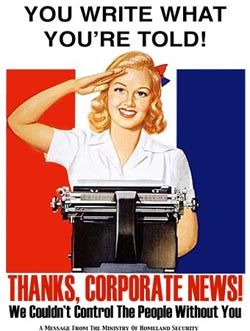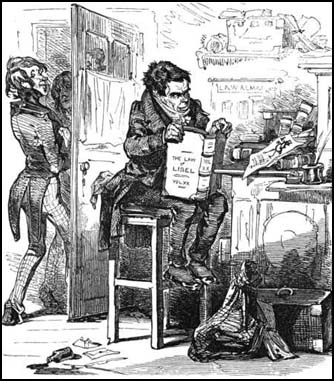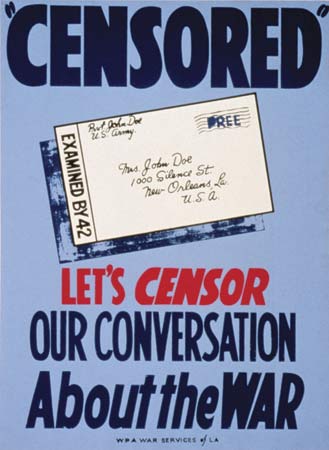NewsTrust.net helps people find good journalism online by posting news feed and allowing the readers to rate on fairness, evidence, sourcing and context. This is a great website that provides a plethora of information and news story. From US politics, media, health and news around the world this website is a great source for news. I enjoy the interactive nature of the website. Plus, it allows other journalists to seek credible and reliable news sources. Members are able to rate the articles and post commentary that allows the public to see criticism and praise. I read three different articles and all three of the articles ranged in style and format. It was interesting to rate the articles and compare my ratings to others.
Wartime Censorship
Posted in Censorship with tags censorship1.jpg on February 14, 2008 by mholbert
 A couple of semesters ago I took a course that specifically dealt with War and Mass Communication. My professor, a veteran from the Vietnam War, based the entire class on films, documentaries, short readings and personal experiences on wartime censorship and propaganda. One class we watched a PBS special called “The Romance of War” which outlined the history of American war correspondents during the first half of the 20th century by highlighting the many challenges of war reporting. From this documentary, I learned that such censorship set the foundation to unethical journalistic practices and in turn the American people are deprived of the truth and realities of what is happening overseas.
A couple of semesters ago I took a course that specifically dealt with War and Mass Communication. My professor, a veteran from the Vietnam War, based the entire class on films, documentaries, short readings and personal experiences on wartime censorship and propaganda. One class we watched a PBS special called “The Romance of War” which outlined the history of American war correspondents during the first half of the 20th century by highlighting the many challenges of war reporting. From this documentary, I learned that such censorship set the foundation to unethical journalistic practices and in turn the American people are deprived of the truth and realities of what is happening overseas.
Now for the history of wartime censorship… that I find fascinating and hopefully you will as well. The Civil War created the foundation to dishonest, unethical and deceptive war reporting. Causalities were grossly underestimated, generals listed as killed lived on to die of old age; battles were reported on days when there was no action at all. Of course at this time fact checking didn’t exist when soldiers were traveling by foot and the only way to spread news was by the creative processes of the reporter’s imagination. However, advancements in technology of course led to more truthful and honest reporting…. Or so we would assume…
Then in 1914 the German invasion of Brussels introduced the beginning of WWI. WWI introduced the military’s power of censorship in the media in order to prevent the discouragement of military volunteers. The media of WWI reflected the traditional mythology of war and journalists were restricted by the power of censorship in order to sustain high public morale. This censorship led to unethical practices of journalism and the censorship imposed by the government carried throughout WWII and every other battle that has been written in our history books.
Here are the questions that I would like to pose to you. Is it the responsibility of the journalist to get past the strict rules of censorship in order to report the truth? Is military and government censorship a violation of our rights as citizens? Can we actually handle the truth? There is so much we do not know. Covert operations. Classified information. If every military and government operation was exposed to the public would this threaten national security?
Freedom of Expression….?
Posted in Seditious Libel and Censorship on February 14, 2008 by mholbertAs a Journalism and Mass Communication major I am required to take a course on Mass Communication Law. In this course, we explore the American legal system and the legal definition of freedom of expression. In doing so, we examine real life Supreme Court decisions relating to the first amendment and the freedom of expression. I find this class to be incredibly interesting and it directly relates to what this blog is about and I thought it would be a nice way to start off my blog exploring cases that censor speech during times of war.
 The first week of class we examined two landmark cases dealing with seditious libel. Seditious libel is when Congress or State legislatures pass laws that punish people for criticizing their own government especially during times of war. In reality, this is the government’s political weapon to silence opposition towards war, radical ideas and expressions. A brilliant propaganda strategy that boosts American patriotism and demonizes the radicals who speak out against the government.
The first week of class we examined two landmark cases dealing with seditious libel. Seditious libel is when Congress or State legislatures pass laws that punish people for criticizing their own government especially during times of war. In reality, this is the government’s political weapon to silence opposition towards war, radical ideas and expressions. A brilliant propaganda strategy that boosts American patriotism and demonizes the radicals who speak out against the government.
During WWI, the Espionage Act of 1917 was established. This law stated that ay insubordination, disloyalty, mutiny or refusal of duty in the armed forces will result in 20 years of prison and $1000 fine. Then the following year the Sedition Act of 1918 was created as an amendment to the Espionage Act of 1917. The Sedition Act of 1918 created a law prohibiting disloyal and profane language causing contempt or scorn towards the federal government, constitution, flag or armed forces.
I am not going to bore you and examine all the Supreme Court cases that we studied that violated these acts. But I wanted to highlight the government’s power in curtailing freedom of expression especially during times of war. It is a scary thought. But is it necessary? Do we as citizens have the right to speak out against our government? Does oppositional rhetoric pose a threat to our national security during times of war? Should the government have the power to limit our freedom of expression in order to maintain high morale and support for our troops overseas? All of these questions have been lingering in the back of my mind ever since the class started. Since WWI, the governmental censorship has existed and it still continues even today. Is censorship necessary for our national security?
A Little About Me…
Posted in Introduction on January 31, 2008 by mholbertWelcome. My name is Michelle Holbert and I am currently a Senior at Arizona State University studying Journalism and Mass Communications with a concentration in Public Relations and a related area in Political Science. I am beginning this blog as a class project in a course that explores digital media entrepreneurship. I decided to research media trends in the United States in times of war and conflict. I will explore media trends from WWI to the present day media coverage in Iraq.
My interest in media trends during war and times of crisis began with a course I took that focused on War and the Mass Media. I had the opportunity to research and learn how media has transcended throughout time. Throughout my studies, I have found the process of channeling information from battle zone to the public quite fascinating. Over the winter, I took a course on American Foreign Policy and did in depth research on the Vietnam War. It was interesting to learn about government and military interaction with the press during times of conflict.
The purpose of this blog is to encourage readers to explore media trends and provoke insight on whether there should be government, military censorship and/or absolute freedom of expression throughout times of war. Do we as citizens have the right to be informed on all aspects of war? In order to ensure public safety is there times that the government and military should have the right to withhold information from the public? Where do we draw the line between freedom of expression and censorship? We will explore these questions by examining mass media trends throughout war by using different articles, videos and case studies. I invite you to post provocative statements and encourage open discussion on this matter. One day I hope to become involved in public policy and I value the importance of dialogue within the community in order to tackle these controversial issues of expression.
